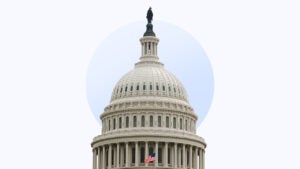Biden launches “Most affordable student loan plan ever” weeks before payment pause ends

Less than a week ago, President Biden announced a new federal student loan repayment plan to assist lower and middle-income borrowers. The Saving on a Valuable Education plan (SAVE) is estimated to benefit over 20 million borrowers by significantly cutting monthly payments, preventing balance accrual due to unpaid interest and bringing borrowers closer to forgiveness faster.
If you’re feeling overwhelmed with the idea of another repayment option — let alone beginning payments again — you’re not alone. With borrowers and servicers scrambling as interest payments begin again on Aug. 31, it’s important to know your options before payments resume on Oct. 1.
SAVE plan “particularly critical” for specific borrowers
SAVE is an income-driven repayment (IDR) plan that calculates a borrower’s monthly payments on their income and family size rather than the loan balance. There are currently five IDR programs offered by the Education Department. However, SAVE offers the lowest monthly payment out of any IDR plan and to nearly every federal student loan borrower.
With SAVE, your monthly payment is based on discretionary income, which is the difference between your Adjusted Gross Income (AGI) and 225 percent of the Department of Human Health and Services Poverty Guideline amount for your family size.
While each IDR plan bases monthly payments off of discretionary income, SAVE reaches a wider range of borrowers in that it increases the income exemption from 150 percent of the poverty line per family to 225 percent.
“The benefits of the SAVE plan will be particularly critical for low-and middle-income borrowers, community college students and borrowers who work in public service,” the White House press brief reads.
Over 1 million borrowers estimated to qualify for $0 monthly payment
Due to the increased poverty guideline, if you’re earning $32,800 or less a year as a single borrower or are a family of four earning $67,500 or less, you won’t owe a monthly payment. According to the Office of Federal Student Aid, those who bring in more than these amounts annually will still save at least $1,000 annually when compared to the current IDR plans.
“The Department of Education estimates that more than 1 million additional low-income borrowers will qualify for a $0 payment,” The press brief reads. “This will allow them to focus on food, rent and other basic needs instead of loan payments.”
SAVE predicted to help borrowers reach forgiveness faster
Once enrolled in the plan, the Education Department will eliminate 100 percent of the remaining interest for subsidized and unsubsidized loans once the scheduled payment is made.
In other words, if you make your monthly payment on time and in full, your loan balance won’t grow due to interest charges. The Education Department estimates that 70 percent of those previously enrolled in an IDR plan before the student loan payment pause would benefit from eliminating interest.
What’s more, according to the White House Council of Economic Advisers, over a 20-year repayment period, the income benefit of the plan could prevent a lower-income borrower’s balance from increasing by roughly 78 percent.
Low-balance borrowers may receive earlier forgiveness
All existing federal IDR plans require borrowers to make qualifying payments for 20 to 25 years; however, those enrolled in SAVE with principal balances under $12,000 will receive forgiveness in less than 120 payments (or 10 years).
Borrowers will be required to make an additional 12 months of payments for each $1,000 borrowed, capping forgiveness at the average IDR timeline of 20 to 25 years.
How to prepare for the end of the repayment pause
If you’re interested in the SAVE plan and you qualify for a lower monthly payment, then it’s best to apply as soon as possible to make sure you’re prepared for the resumption of payments come October.
To apply for the plan you’ll need to fill out the IDR application that’s housed on the Education Department’s website. Make sure you select the option for your loan servicer to enroll you in the plan with the lowest monthly payments.
If you’re currently enrolled in a different IDR plan, you can enroll in the SAVE plan on the StudentAid.gov website. If you were enrolled in REPAYE, you’ll automatically be enrolled in SAVE.
Why we ask for feedback Your feedback helps us improve our content and services. It takes less than a minute to complete.
Your responses are anonymous and will only be used for improving our website.






